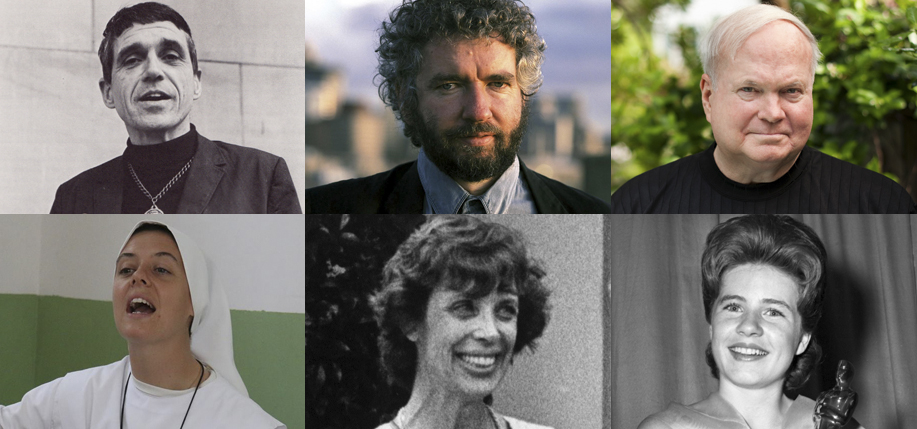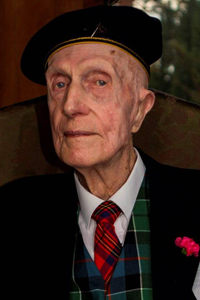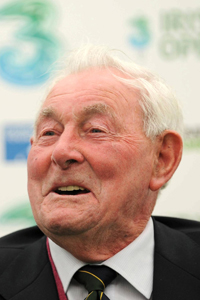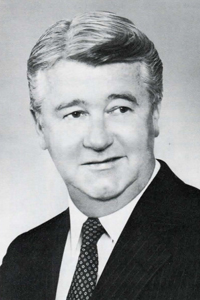Recent passings in Ireland and Irish America.
℘℘℘
Daniel Joseph Berrigan, S.J.
1921 – 2016
Daniel Berrigan, activist Jesuit priest and intellectual, author, and pacifist agitator who served as inspiration for the character Father Corrigan in Colum McCann’s 2009 novel, Let the Great World Spin, died in the Bronx on April 30, age 94.
Daniel was born May 9, 1921 in Virginia, Minnesota, the son of Frieda and Thomas Berrigan, the latter of whom was a second-generation Irish Catholic. The family moved to Syracuse, New York, where Daniel’s lifelong dedication to the Catholic Church brought him into the Jesuit order immediately after high school.
An award winning writer and poet with more than 50 books to his name, Berrigan emerged as one of the leading lights of the Catholic Church’s “New Left” movement in the 1960s. His brand of pacifist protest was one of praxis over passive resistance, and as a leading member of the Catonsville nine, he, his brother Philip (also a priest), and their seven Catholic cohorts used homemade napalm to destroy 378 draft files in the parking lot of the Catonsville, Maryland, draft board which they raided on May 17, 1968.
Berrigan then went on the run, refusing to acquiesce to the three-year prison sentence handed to him by what he saw as an illegitimate authority. He was eventually caught, imprisoned, and released in 1972 – but remained undeterred. Berrigan carried on with a life of Catholic dedication and protest, forming also the anti-nuclear weapon movement, the Plowshare Movement, and later opposed many other American military interventions abroad. “The day after I’m embalmed,” he said in 2001, on his 80th birthday, “that’s when I’ll give it up.” – R.B.W.
David Ross St. John Beresford
1947 – 2016
Award winning journalist David Beresford, best known for his detailed reportage of the Troubles in the north of Ireland, died in April at his home in Johannesburg, South Africa at the age of 68 after years of battling Parkinson’s disease.
In 1978, David was working for the Guardian when he become a correspondent in Ireland. The Troubles were at that point in full force, and his unique experiences and insights eventually culminated in the 1987 release of his well-known book, Ten Men Dead, which tells the harrowing tale of the 1981 hunger strike of IRA prisoners held in Long Kesh.
Sinn Féin leader Gerry Adams payed tribute to Beresford, calling him “an exceptional journalist” and Ten Men Dead “probably the best book written about that period.”
Born in Johannesburg, the youngest of three sons of St. John, a banker, and his wife, Faith (née Ashby), the family moved to Salisbury, Rhodesia (now Harare, Zimbabwe), when David was seven. In the 1970s he moved to Britain, and got his first job as a journalist in the U.K. with the South Wales Echo.
Beresford was named foreign correspondent of the year twice, and along with his renowned coverage of the northern Irish Troubles, he also received acclaim for his coverage of the Apartheid regime in South Africa and for his coverage in 1991 of the American lead Operation Desert Storm.
Paul Webster, former foreign editor of the Guardian David’s long time employer, said, “David Beresford was one of the greatest correspondents of his generation. He was a tenacious and brave reporter, a brilliant investigator, had a fine analytical mind, and was a wonderful, lucid, graphic writer – a rare combination of skills.” – R.B.W.
Pat Conroy
1945 – 2016
Acclaimed novelist and New York Times best selling author Pat Conroy, died in Beaufort, South Carolina, after a brief battle with pancreatic cancer.
Pat was born October 26 to parents who served as the inspiration for many of his works. To his mother, he credited his desire to write, but it was from his abusive, discipline obsessed father that he derived the material for his first novel, The Great Santini, an autobiographical work that explores the tumult of living in a family dominated by a pugnacious professional military man and the relationships that develop between abuser and abused.
Pat described his father as a “dreary, somber Irishman,” in a 1995 interview with Irish America. Consequently, “All the things Irish that could be beautiful, came to me twisted,” he recalled. Nevertheless, he had a drive to go to Ireland, to find his relatives, and to “discover what all this is, because I feel it inside me, all the time,” he said.
Editor Nan A. Talese of Doubleday remembers Pat as “a beloved friend and author for 35 years” and said, “He will be cherished as one of America’s favorite and bestselling writers.”
Conroy authored many best-selling works, four of which, including The Great Santini and The Prince of Tides, were made into movies. The latter work brought commercial success and renown for Pat, especially after Barbra Streisand both directed and starred in the film adaptation along with Nick Nolte.
The eldest of seven children, Pat’s early life was peripatetic and violent. He moved with his family from one military base to the next before settling in South Carolina. It was there that he graduated from the Citadel Military Academy in Beaufort, the town where he also spent his final days. He is survived by his third wife, fellow writer Cassandra King, four children, five stepchildren, five siblings, and seven grandchildren. – R.B.W.
Sister Clare Theresa Crockett
1983 – 2016
Sr. Clare Theresa Crockett, a Catholic nun from Derry who was based at the Colegio Sagrada Familia school in Playa Prieta, Ecuador, was killed while leading others to safety after an earthquake of magnitude 7.8 ravaged the country on April 16.
With a death toll over 600 and hundreds more injured, the Earthquake has been described as “the worst tragedy in 60 years,” by Ecuadorian Defense Minister Ricardo Patiño.
Sr. Clare was teaching children at her school to play the guitar when the earthquake struck, and it is believed that she was leading the children to safety through a stairwell when the four-story building collapsed. Her body was found in the rubble about 36 hours after the quake.
Sr. Clare found her calling after signing up for what she thought was a free vacation to Spain and an excellent chance to party abroad. As it turned out, the trip was actually a pilgrimage. After spending her youth focused on theater, acting, and revelry, it was on that fateful journey that she found her true calling.
It was around that time that she also landed a small part in Paul Greengrass’s Bloody Sunday, a film about the Parachute regiment’s killing of innocent civilians in Derry in 1972.
“Sr. Clare devoted her life to children and young people and died selflessly helping those in need in Ecuador,” Northern Ireland’s Deputy First Minister Martin McGuinness said.
“It is unbelievable. She has been a missionary for 15 years and been all over the world doing her work.”
Her cousin, Emmet Doyle commented on her passing saying, “She was a superstar. Everybody loved her. She died as she lived, helping others.” – R.B.W.
Patricia Derian
1929 – 2016
The human rights activist and U.S. civil rights advocate Patricia Derian, who also served as President Jimmy Carter’s assistant secretary of state for human rights and humanitarian affairs, died in May of Alzheimer’s at her home in North Carolina. She was 86.
During her tenure in the executive branch, Derian used her power to persuade the White House to use foreign aid as a way to curtail human rights abuses in foreign countries, including during Argentina’s “Dirty War,” with the authoritarian President Ferdinand Marcos in the Philippines, and elsewhere.
“Pat spent hundreds of hours meeting with victims and their families. She became a champion of oppressed people around the world,” President Jimmy Carter said in a statement. “Because of her determination and effective advocacy, countless human rights and democracy activists survived that period, going on to plant the seeds of freedom in Latin America, Asia, and beyond.”
Born Patricia Sue Miriam Murphy in 1929 in Manhattan, Derian was raised in Danville, VA, graduating from nursing school at the University of Virginia before moving to Jackson, MS. There, she entered the Civil Rights movement and organized the Loyalist Democrats, a bi-racial alternative to the whites-only state delegation to national conventions. She served as deputy director for the 1978 Carter-Mondale presidential campaign, and married her second husband, Hodding Carter III, who would be Carter’s assistant secretary of state for public affairs, that same year.
“She spoke truth to power and never stopped. I’m blessed that I was with her,” he told the Boston Globe.
In addition to Carter III, she is survived by three children from her first marriage, four step-children, two grandchildren, and ten step-grandchildren. – A.F.
Anna Marie Duke
1946 – 2016
Academy Award winning actress Anna Marie “Patty” Duke, who first gained notoriety as a teenage star at age 16 for her role as Helen Keller in The Miracle Worker, died in March at a hospital near her home in Coeur d’Alene, Idaho, from complications of a ruptured intestine.
Duke was born Dec. 14, 1946, and raised in Elmhurst, NY. She had been involved in theater, broadway, cinema, and television for most of her life, and her legacy lives on through those that survive her including her husband and sons Mackenzie and Sean Astin, the latter of whom is known for his roles in Rudy and the Lord of the Rings.
“This morning, our beloved wife, mother, matriarch and the exquisite artist, humanitarian and champion of mental health, Anna Patty Duke, closed her eyes, quieted her pain, and ascended to a beautiful place,” said a statement from the family. “We celebrate the infinite love and compassion she shared through her work and throughout her life.”
Duke also starred in her own sitcom, The Patty Duke Show, in which she played two “identical cousins.” She later starred as Neely O’Hara in the cult classic, Valley of the Dolls. She was also nominated for 10 Emmy awards, of which she won three.
Aside from her acting career, Patty was known for her work on behalf of those who suffered from mental illness. She was diagnosed with bipolar disorder in 1982, after which she wrote about her experiences with her condition in her autobiography, published in 1987. She was well-known thereafter for her advocacy of raising awareness for issues related to mental health. – R.B.W.
1916 – 2016
John Leslie, otherwise known as “Uncle Jack and, more formally, “Captain Sir John Norman Ide Leslie, 4th Baronet,” died in April. He was the eldest son of Sir John Randolph Leslie, 3rd Baronet, and Marjorie Ide. A cousin of Winston Churchill, he became the fourth baronet upon his father’s death in 1971, and was later crowned “the disco king of Ireland” when in his 80s he discovered his love of dance clubs and the music he famously dubbed, “the boom boom music.”
“Words can’t describe our bittersweet joy at the manner of his living and dying,” Mark Leslie, his nephew, said at his funeral. “I’m still basking in the golden glow of his departure.”
Though much of his life was spent in London, traveling the globe, or living in a restored Monastery in Rome, he eventually settled once again in his native Monaghan, taking up residence at his family home Castle Leslie, which was the place where Paul McCartney married Heather Mills, a fact that Uncle Jack famously divulged on live television just before the wedding by blurting, “it’s on Tuesday, but it’s a secret.”
Jack’s life was filled with socializing and populated by lords and ladies, but it was not without hardship either. He fought the Nazis in France, was captured, and remained in a POW camp for years thereafter, for which he would be appointed a chevalier of the National Order of the Legion of Honour, France’s highest medal.
“Jack was such a special person, who was loved by many,” his nephew Mark says. “He never said a bad word about anyone, not even the people who captured him and brought him to prisoner of war camps in Germany.” – R.B.W.
1924 – 2016
In May, Irish golfer Christy O’Connor, Sr., who participated in 10 consecutive Ryder Cup teams and was the second Irishman ever inducted to the World Golf Hall of Fame, died at his home in Ireland. He was 91. His death follows that of his nephew, fellow golfer Christy O’Connor, Jr., who died unexpectedly while on vacation in the Canary Islands in January.
O’Connor, who was born in 1924 in Knocknacarra, Co. Galway, dominated the European golf circuit for four decades, winning 24 times on the European Tour, and playing 15 times in the World Cup. Until 1997, he held the record for the most Ryder Cup appearances by any golfer. In Ireland, he was known as the “father of Irish golf.”
“When I was growing up, the name Christy O’Connor was synonymous with Irish golf,” his friend, Fr. Martin Hogan, told the Belfast Telegraph.
“He was our national golfing treasure who could compete with the giants of golf from all around the world and beat many of them more than once.”
“Christy was built like a bull but he had incredible hands for golf,” Ryder cup director Richard Hills said in a statement. “Christy did so much for the game and his legacy will long live on,” he said. “After the tragic, sudden death of his nephew in January, golf has lost two of its greatest men.”
He is survived by his wife, Mary, and five children. – A.F.
1916 – 2016
Former Merrill Lynch CEO Daniel Tully, pioneer of the 1990s “Mother Merrill” business model which tripled Merrill shares during his tenure, died while visiting his daughter, Eileen Ceglarski, in Darien, CT in May at the age of 84.
Tully was appointed CEO in 1992, after serving the company for almost 40 years, and ushered in its most profitable years to date during his five-year control. As good as he was with numbers, he was equally gifted in conversation and true care for his work, attributing this to his Irish upbringing. When he was made CEO, he had his carpets changed to Kelly green, and was often heard singing “When Irish Eyes Are Smiling.”
“On road trips, he would follow up client meetings with visits to the local offices of Merrill Lynch private client managers, where his glad-handing and banter weren’t an act, but the expression of a man who actually cared about the firm’s network of financial advisers,” Greg Farrell wrote in his 2010 book about the firm’s collapse, Crash of the Titans.
Daniel Patrick Tully was born in 1932 in New York and raised in Woodside, Queens, a heavily working-class neighborhood filled with Irish and Irish Americans. His father was a steamfitter, and the family assumed he would follow in his footsteps. But after a two-year stint in the U.S. Army following college, Tully returned to St. John’s University career center to see who was hiring. He applied for a job at Merrill Lynch, not even knowing what the company did. His mother, he told Irish America in 1985, congratulated him on getting a job in advertising.
In addition to his daughter Eileen, Tully is survived by his wife of 59 years, Grace, three children, and 13 grandchildren. – A.F. ♦





Leave a Reply